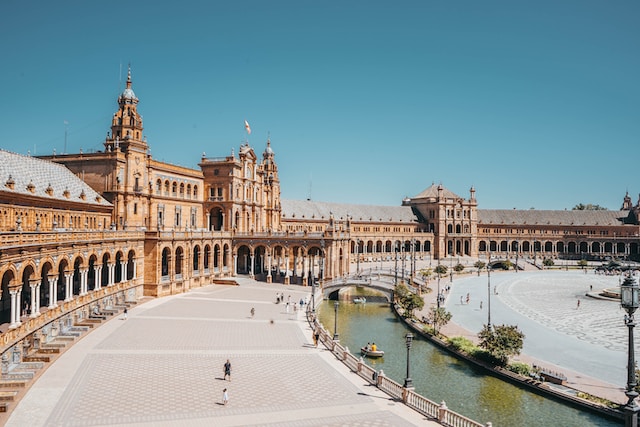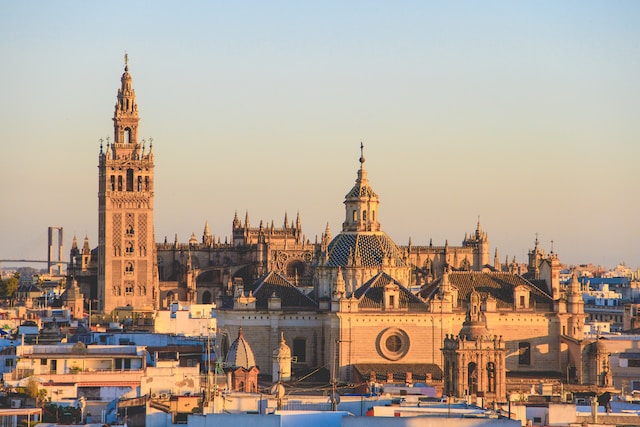Living in Seville, Spain – My Digital Nomad Haven
Seville, the charming southern Spanish city, is fast becoming a top destination for digital nomads seeking a vibrant culture, affordable cost of living, and excellent work-life balance.
This wholesome and thriving city offers a blend of rich history and modern amenities – making it perfect for remote workers looking to immerse themselves in Spain’s captivating Andalusian lifestyle.
In this comprehensive guide, we’ll explore everything you need to know about living and working remotely in Seville – from accommodation options and co-working spaces to local attractions that will enrich your experience.
My Thoughts on Seville as a Digital Nomad
As I strolled through the narrow cobblestone streets of Seville, the warm Andalusian sun kissed my skin, filling me with a sense of excitement and adventure. Seville, the enchanting city where history, culture, and technology seamlessly intertwine, had become my digital nomad haven. Let me take you on a journey through my experiences in this beautiful Spanish city.
One of the things that amazed me about Seville was its abundance of co-working spaces tailored to the needs of digital nomads like myself. The city was teeming with innovative workspaces where I could plug in my laptop and dive into my projects while surrounded by like-minded individuals. The first space I tried was Impact Hub Seville, a vibrant hub located in the heart of the city. The collaborative atmosphere and excellent facilities provided the perfect environment for productivity.
When I needed a change of scenery, I would often head to La Seta, an iconic rooftop workspace with panoramic views of Seville’s historic center. Working against the backdrop of stunning architecture and the vibrant orange hues of sunset was a truly inspiring experience.
But Seville wasn’t all about work. The city offered a treasure trove of cultural and historical wonders waiting to be explored during my downtime. The Real Alcázar, a UNESCO World Heritage site, was a breathtaking palace that transported me back in time with its stunning Moorish architecture and lush gardens. I often found solace in these serene surroundings, wandering through the courtyards and marveling at the intricate tile work.
To immerse myself further in the local culture, I would spend my evenings getting lost in the narrow streets of the Santa Cruz neighborhood. This charming labyrinth of whitewashed buildings, lively tapas bars, and cozy cafés never failed to captivate me. With a glass of sangria in hand, I would indulge in traditional Andalusian dishes like gazpacho and salmorejo, savoring the explosion of flavors that danced on my palate.
Seville’s nightlife was an experience in itself. As the sun set, the city came alive with energy and rhythm. Triana, the birthplace of flamenco, was my go-to spot for live performances that left me in awe of the passionate dancers and soul-stirring melodies. The Triana Market, with its vibrant atmosphere and delicious street food, was the perfect place to unwind and mingle with locals and fellow nomads.
On weekends, I would escape the city’s hustle and bustle to explore the surrounding natural beauty. A short trip to Sierra de Aracena allowed me to recharge amidst lush forests, gushing waterfalls, and picturesque villages. Hiking through the breathtaking landscapes provided a much-needed break from screens and deadlines.
My time in Seville as a digital nomad was a harmonious blend of work and play, ancient history and modern innovation. It was a place where I could nourish my creative spirit while immersing myself in a vibrant culture that sparked my curiosity. As I bid farewell to this enchanting city, I carried with me not only memories but also a renewed sense of inspiration and a longing to return someday. Seville, you will forever hold a special place in my heart.
Key Takeaways
- Seville is an affordable destination for digital nomads with a relatively low cost of living compared to other European cities.
- Accommodation options include co – living spaces, Airbnb apartments and hostels that cater to different needs and budgets.
- Coworking spaces, cafes with reliable Wi – Fi and outdoor spaces offer plenty of options for remote workers looking for a place to work from.
- Seville offers traditional Spanish cuisine as well as vegetarian and vegan – friendly options.

Cost Of Living And Accommodation Options In Seville For Digital Nomads – best places to live
Seville offers an affordable cost of living, with co-living spaces, Airbnb apartments and hostel options available for digital nomads.
Affordable Cost Of Living
One of the most appealing factors for digital nomads choosing Seville as their base is the city’s affordable cost of living. In comparison to other popular European destinations, Seville offers a high quality lifestyle without breaking the bank.
Rent in this charming Andalusian city is significantly lower than that of major Spanish cities like Madrid and Barcelona.
In addition to affordable housing, everyday expenses such as groceries, utilities, entertainment and dining out are also reasonably priced. Practising mindfulness when it comes to costs can lead to considerable savings; for example, embracing the local custom of exploring tapas bars instead of dining at high-end restaurants can allow you to enjoy delicious Spanish cuisine and immerse yourself in traditional culture without straining your budget.
Co-Living Spaces And Airbnb Apartments
Seville offers a variety of accommodation options for digital nomads, with co-living spaces and Airbnb apartments being popular choices that cater to different needs.
- Co-Living Spaces:
- Provide a sense of community and networking opportunities
- Shared common areas, including kitchen, living room, and sometimes coworking spaces
- Activities and events organised for residents to socialise
- Starting prices from €350 per month
- Rooms typically include basic furnishings such as bed, desk, and closet
- Airbnb Apartments:
- Prime option for individuals seeking privacy or travelling with family members
- Choose from shared rooms, private rooms or entire apartments/houses
- Accommodations available in various neighbourhoods around Seville
- Allows you to experience life as a local in the city
- Prices vary depending on location and type of apartment; one-bedroom apartments may range between €450-600 per month
Hostel Options
Seville offers various hostel options that cater to digital nomads, providing a cost-effective and social living environment. The top choices include:
- Black Swan Hostel Sevilla: A popular choice among digital nomads, this hostel provides fast Wi-Fi, comfortable workspaces, and a central location near numerous cafes and coworking spaces.
- Toc Hostel Sevilla: Situated in the city centre, Toc Hostel boasts excellent Wi-Fi connectivity, modern facilities and a lively atmosphere for networking with fellow travellers.
- La Banda Rooftop Hostel: This trendy hostel features a rooftop terrace perfect for remote work while enjoying stunning views of Seville Cathedral. Additionally, it offers reliable Wi-Fi and communal spaces to interact with like-minded individuals.
- Oasis Backpackers’ Palace Seville: With dedicated work areas, strong internet connection and close proximity to historical sites, Oasis Backpackers’ Palace makes an ideal base for digital nomads seeking culture and entertainment.
- For You Hostel Seville: Located in the heart of the city, this beautifully restored 19th-century mansion provides convenient access to public transportation as well as high-speed internet for seamless remote work.
These hostels stand out for their friendly environments tailored towards digital nomads who can balance work with cultural experiences in one of Spain’s most charming cities.
Best time to visit Seville
The best time to visit Seville is during the spring (March-May) or fall (September-October). During these months, the weather is mild and sunny, with average temperatures in the mid-60s to low 80s Fahrenheit. The crowds are also smaller during these times, making it easier to explore the city and find affordable accommodations.
If you’re planning to visit Seville during the summer (June-August), be prepared for hot, humid weather. Temperatures can often reach into the 90s Fahrenheit, and the city can get quite crowded.
Best Places To Work Remotely In Seville – find a coworking space
Seville offers a plethora of great places for digital nomads to work remotely, including coworking spaces like The Living Room and WorkInCompany, cafes with reliable Wi-Fi such as La Cacharrería and Recoveco Coffee & Kitchen, as well as outdoor spaces like Parque de María Luisa and the banks of Guadalquivir River.
Coworking Spaces
Seville has a thriving community of coworking spaces that cater to the needs of digital nomads and remote workers. Here are some of the best ones:
- Surf Office – Located in the heart of Seville, this coworking space provides high-speed internet, private offices, and free coffee for its members.
- workINcompany – This modern coworking space offers shared desks, private offices, and meeting rooms with a unique design that inspires creativity.
- Arcadia Coworking – Ideal for startups and freelancers, this bright and spacious coworking space is located in the trendy neighbourhood of Alameda de Hercules.
- Galia Puerto – Located in Triana, this laid-back coworking space offers a comfortable environment to work along with facilities including printers, scanners, and projectors.
- Espacio RES – A creative hub located in Macarena that provides various amenities such as meeting rooms, an events area alongside desks to boost productivity pursuit.
- INN Offices Sevilla Cartuja – Perfectly placed near the outskirts of Seville city center is where you will find this modern business center offering serviced offices on flexible leasing terms
- iSspaces- Strategically situated in Santa Justa District providing innovatively designed co-working spaces catering to every comfort of digital nomad or remote worker
- Thinking- Boasts a tranquil working environment located near the old town where there’s no traffic or noise pollution coupled with state-of-the-art equipment at every desk.
With numerous options available online platforms such as Coworker.com, Nomad List or Workfrom can help locate you the perfect spot to spend your productive hours without worrying about setting up shop from scratch.
Cafes With Reliable Wi-Fi
For digital nomads, finding a reliable cafe with fast Wi-Fi is essential. Here are some of the best cafes in Seville that offer just that:
- La Cacharreria: This quirky cafe boasts a vintage decor and a chill atmosphere, perfect for getting work done. They offer free Wi-Fi and have plenty of power outlets to keep your devices charged.
- El Viajero Sedentario: Located in the hip Alameda de Hercules neighbourhood, this cafe serves up delicious coffee and has speedy Wi-Fi. The interior is bright and welcoming, making it a great spot to spend a few hours working.
- Torch Coffee Roasters: A specialty coffee shop with an industrial-chic vibe, Torch Coffee Roasters provides strong Wi-Fi and comfortable seating options for remote workers.
- Horno San Buenaventura: This bakery-cafe is located in the heart of the city centre and offers free Wi-Fi and air conditioning. With large windows overlooking the bustling streets of Seville, it’s a great place to people-watch while you work.
- Strada Cafe: Conveniently located near both the Cathedral and Alcazar, Strada Cafe has reliable Wi-Fi and ample seating options inside or outside on their terrace. They also serve delicious pastries if you need a little pick-me-up while working.
- Eureka Cafe Cultural: This artistic cafe doubles as an art gallery and event space but also provides free Wi-Fi for guests. With cozy seating areas throughout the space, Eureka Cafe Cultural is perfect for those looking for an inspiring work environment.
Remember to always check with staff before setting up if using cafes that you follow rules about occupying tables too long in busy periods so as not to cause problems for others needing seats during peak hours!
Outdoor Spaces
Seville is a city full of lush landscapes, making it an excellent option for digital nomads who enjoy working outdoors. Here are some outdoor spaces to consider when working remotely in Seville:
- Parque de Maria Luisa: This beautiful park is located in the heart of the city and features charming gardens, fountains, and monuments making it a serene spot to work from.
- Plaza de España: This popular tourist attraction features impressive architecture and offers free Wi-Fi, making it a perfect place for digital nomads to work while taking in the stunning views.
- Alameda de Hercules: Located in the Macarena neighbourhood, this park boasts several benches and shaded areas surrounding a vibrant square with restaurants and bars nearby.
- Banks of the Guadalquivir River: For those who love waterfront views, Seville’s most significant river provides plenty of space for digital nomads to set up their workstations under its many bridges or at one of the riverside cafes along its banks.
- Terraces with views: Various rooftops terraces such as Hotel Eme’s or Doña María provide scenic panoramas over the city where Nomads can enjoy small-town feels with panoramic views.
With Seville’s temperate climate and beautiful outdoor spaces, Digital Nomads have lots to discover while exploring new outdoor settings that inspire creativity for their remote work projects!
Food And Drink Options For Digital Nomads In Seville
Seville boasts of traditional Spanish cuisine for digital nomads, with plenty of tapas bars and restaurants around the city.
Traditional Spanish Cuisine
Seville offers a culinary experience like no other, and food is an essential part of the city’s culture. You can immerse yourself in traditional Spanish cuisine by visiting one of the many tapas bars found throughout the city centre.
The best way to try everything is to order several small plates and share them with friends or fellow digital nomads. Some must-try dishes include patatas bravas (spicy potatoes), tortilla española (Spanish omelette), and croquetas de jamón (ham croquettes).
If you’re looking for vegetarian or vegan-friendly options, don’t worry because Seville has plenty of them too. Some popular dishes include gazpacho (cold tomato soup), salmorejo (a thicker version of gazpacho), berenjenas con miel (fried eggplant drizzled with honey), and pimientos de padrón (small green peppers).
Vegetarian And Vegan Options
Seville is a great destination for vegetarians and vegans, with a variety of options available. Here are some of the best spots to check out:
- El Paladar Sin Fronteras: This restaurant offers a fusion of world cuisine, including plant-based options.
- El Enano Verde: Known for its vegetarian burgers, this restaurant also offers vegan and gluten-free options.
- Bodeguita Romero: This tapas bar has meat-free options such as tortilla de patatas (Spanish omelette) and espinacas con garbanzos (spinach and chickpeas).
- La Bartola: This seafood-focused restaurant also serves vegetarian options like roasted vegetable paella.
- Abaco: A rooftop terrace bar with vegan-friendly cocktails and appetizers.
- Alameda 39: A bakery that sells vegan treats alongside their regular baked goods.
Happy Cow, a website that lists vegan and vegetarian-friendly restaurants, has several listings for Seville and can be a useful resource for digital nomads looking for food options.
Nightlife And Social Options
Seville is a social city with plenty of options for digital nomads to connect with other locals and travellers. Here are some nightlife and social options to consider:
- Tapas Crawl: Enjoy Seville’s famous tapas bars, where you can sample traditional Spanish cuisine and meet new people.
- Rooftop Bars: Take in the city’s stunning views from one of Seville’s many rooftop bars while enjoying a drink.
- Nightclubs: There are several popular nightclubs in Seville that are perfect for dancing the night away.
- Live Music: Catch a live performance at one of the many venues throughout the city, including flamenco shows, jazz clubs, and more.
- Festivals: Seville hosts several festivals throughout the year, including Feria de Abril in spring and Semana Santa in April, which offer an opportunity to experience local culture and traditions while meeting new people.
- Meetups: Join a digital nomad or expat meetup group in Seville to network with like-minded individuals.
- Language Exchange: Attend a language exchange event to practise your Spanish while making new friends.
- Sports Clubs: Join a local sports club or gym to stay active and meet new people who share your interests.
- Cultural Events: Participate in cultural events like art exhibitions, theatre performances, or poetry readings to immerse yourself in Seville’s vibrant arts scene.
- Volunteer Opportunities: Get involved in volunteer work or community service projects to make meaningful connections while giving back to society.
Seville offers plenty of opportunities for digital nomads who want to have an active social life outside of work hours while also experiencing Spanish culture. Make sure you take advantage of these options during your stay!

Seville, Spain
Transportation In Seville For Digital Nomads
Seville has an efficient and affordable public transportation system that includes buses, trams, and metro lines that can be easily accessed with a travel card.
Public Transportation
Seville’s public transportation is an affordable and reliable option for digital nomads. The city has an extensive bus network that covers all areas of the city, with most buses leaving from either Puerta de Jerez or Plaza.
You can also explore Seville using the metro, which has four lines connecting different parts of the city.
To save on transportation costs in Spain as a whole, consider purchasing a monthly ticket or travel card at a discounted rate. Public transportation prices vary from city to city in Spain so check out your destination’s options before you arrive.
Bike Rentals
Seville is a bike-friendly city and offers various bike rental options for digital nomads to explore the city. Here are some options:
- Sevici: Seville’s municipal bike rental program that has more than 250 stations across the city, offering thousands of 3-speed unisex bikes at affordable rates.
- Electric Bike Rental: Many companies offer electric bikes for rent in Seville. Renting an electric bike is an excellent option for digital nomads to travel through Seville’s stylish streets on a 2.5-hour tour.
- Road Bike Rental: Seville also provides road bike rentals for digital nomads who want to explore the city when keeping up with their workout routine.
- Lime Bikes: Lime Bikes are also available in Seville, and they are one of the most popular bike rental options among locals and digital nomads alike.
Digital nomads can use these various rental options to have a more eco-friendly means of exploring Seville, get some exercise, and save money while doing so. Additionally, using a bicycle gives you access to many parts of the city which might be easily missed when traveling by public transportation or car.
Walking
Seville is a walkable city, and getting around on foot is one of the best ways to explore this stunning destination. With winding streets and picturesque plazas seemingly at every turn, walking offers digital nomads an excellent opportunity to soak up some culture while also staying active and alert throughout the day.
One must-visit area is Barrio Santa Cruz, where you’ll find narrow streets filled with cafes and outdoor patios ideal for remote work or taking breaks during the day. And with affordable public transport options also available (including a travel card giving access to buses, trams, and Metro lines), Seville makes it easy to combine walking tours with longer journeys across town.
Must-Visit Tourist Attractions In Seville For Digital Nomads
Digital nomads visiting Seville should not miss some of the city’s top tourist attractions, such as exploring the Alcázar of Seville, admiring the stunning architecture of Seville Cathedral and Giralda Tower, soaking up the vibrant atmosphere at Plaza de España, and experiencing traditional Flamenco shows.
Alcázar Of Seville
The Alcázar of Seville is an iconic must-visit tourist attraction for digital nomads in Seville. This historical palace complex, which dates back to the 14th century, features an incredible mix of architectural styles that reflect the city’s rich cultural heritage, including Gothic and Moorish influences.
With its stunning gardens and intricate tilework, it provides plenty of inspiration for those seeking a peaceful working environment with a touch of charm and history.
To make the most out of your visit to this amazing site, it’s advisable to purchase tickets ahead of time or even organise a guided tour. While queues at the entrance can be long during peak seasons such as March and May, passes like Sevilla Card offer great value-for-money options that give you access not only to some sites but also free transportation throughout Seville.

Seville Cathedral And Giralda Tower
Seville Cathedral And Giralda Tower
Seville Cathedral and Giralda Tower are two of the most iconic structures in Seville, drawing digital nomads from all over to marvel at their beauty. The cathedral is the largest gothic cathedral in the world and home to Christopher Columbus’s tomb.
Its famous bell tower, La Giralda, once served as a minaret for the Almohad Mosque and is now a symbol of Seville. Visitors can climb up its 35 ramps to enjoy stunning views of the city.
It’s worth noting that there’s an entrance fee to enter Seville Cathedral, but it grants access to both buildings as well as numerous art pieces inside.
There are strict dress codes in place, so make sure you wear appropriate clothing (no shorts or sandals).
Plaza De España
Located in the heart of Seville, Spain, Plaza de España is a must-visit tourist attraction for digital nomads. Built-in 1929 as part of the Ibero-American Exhibition, this beautiful square is surrounded by stunning buildings and picturesque canals that offer visitors a glimpse into the city’s rich history.
The plaza itself features ornate bridges, intricate tile work, and stunning views of the nearby Maria Luisa Park. Visitors can also explore the numerous museums located in and around the plaza or take part in traditional Spanish activities such as horse-drawn carriage rides or hiring rowboats to paddle around the canal.
Flamenco Shows
Seville is renowned for its flamenco shows, which are an important part of the city’s cultural heritage. For digital nomads looking to immerse themselves in Seville’s vibrant atmosphere, watching a live flamenco show is an absolute must-do activity.
Whether you want to catch a live performance at La Carbonería or enjoy dinner and a show at El Palacio Andaluz, there are many different options available that cater to every budget and preference.
Safety And Health Considerations For Digital Nomads In Seville
Stay safe during your stay in Seville by being aware of the crime rates and taking necessary precautions. Healthcare options are available but it’s best to have travel insurance as well.
Crime Rates And Safety Precautions
Seville is a safe city for digital nomads, with low crime rates. However, it’s important to be aware of some common issues such as bicycle theft and break-ins.
To ensure safety while exploring the city, it’s recommended to keep an eye on your valuables and trust your instincts. Pickpocketing can also occur in busy tourist areas, so it’s advisable to be cautious when carrying wallets or purses.
It’s best not to carry your passport around with you during the day – instead, consider leaving it in a secure location where you’re staying.
Healthcare Options
As a digital nomad in Seville, it’s important to know about the available healthcare options. Here are some things you need to keep in mind:
- Spain has a public healthcare system that provides free or low-cost medical care to residents and citizens.
- If you’re an EU citizen, you can use your European Health Insurance Card (EHIC) to access medical care in Spain. However, if you’re planning to stay for more than three months, it’s recommended that you register with the local authorities and obtain a social security number.
- Non-EU citizens may need to purchase private health insurance or pay out-of-pocket for medical services.
- Seville has several private hospitals and clinics that provide high-quality medical care. Some of the popular ones include USP Hospital de Nuestra Señora de la Candelaria, Quirónsalud Sagrado Corazón Hospital, and Hospital Viamed Santa Ángela de la Cruz.
- You can also find English – speaking doctors and dentists in Seville who cater to expats and tourists. Some of them include International Medical Clinic Sevilla, Dr. Andersson Dental Clinic Sevilla, and Clínica Estética Rocío Vázquez.
- In case of emergency, dial 112 (English – speaking operators available) for ambulance services or visit the nearest hospital’s emergency department.
Remember that some digital nomad visa schemes require purchasing health insurance as part of the application process. It’s always a good idea to have travel insurance too so that you’re protected against any unexpected healthcare expenses or other travel-related issues.
Visa And Legal Requirements For Digital Nomads In Seville
To work as a digital nomad in Seville, it’s important to know the Schengen visa requirements and consider any necessary work permits.
Schengen Visa Requirements / digital nomad visa
To stay in Seville as a digital nomad, it’s important to meet the Schengen Visa requirements. Here are some essential points about the Schengen Visa for digital nomads:
- The Schengen Visa allows you to travel within the Schengen territory, which includes 26 European countries, including Spain.
- As a digital nomad, you’ll need to apply for a short-stay visa that allows you to stay in Spain for up to 90 days in any 180-day period.
- To apply for the visa, you’ll need to provide proof of your purpose of travel and financial means to support yourself during your stay.
- You may also be required to show proof of accommodation and travel insurance that meets certain requirements.
- Non – EU citizens should apply for the visa at least three months before their intended travel date and provide all necessary documentation.
- It’s important to note that overstaying your visa can result in fines, deportation, or future difficulties obtaining visas.
As of May 2023, non-EU citizens can also apply for the Spanish Digital Nomad Visa, which allows remote workers and digital nomads to live in Spain for up to five years. However, specific requirements must be met and demonstrated in order to qualify for this type of visa.
Work Permit Considerations
If you’re a digital nomad looking to work in Seville, it’s important to be aware of the visa and work permit requirements. Non-EU citizens must obtain a work permit and visa before taking up any local jobs, including remote work.
However, there is good news – Spain recently launched the Digital Nomad Visa, which allows remote workers and digital nomads to live in Spain for up to five years.
To apply for this visa, non-EU citizens must meet certain requirements such as having relevant work experience of at least three years or a diploma from a prestigious school that demonstrates their expertise as a digital nomad.
It’s worth noting that the process can be time-consuming, so it’s best to plan ahead and ensure that all necessary documents are prepared beforehand.
Digital Nomad Community In Seville
Connect with like-minded individuals by joining a digital nomad community in Seville. Meetup groups and Facebook communities are great ways to network and find events to attend.
Meetup Groups And Facebook Communities
Seville has a thriving digital nomad community, and connecting with fellow remote workers is an excellent way to enrich your travels. There are over 13 digital nomad groups on Meetup.com and Facebook, with a combined membership of more than 13,000 people! Here are some of the best digital nomad groups to join in Seville:
- Digital Nomads Sevilla: This Meetup group organizes networking events and social gatherings for digital nomads in Seville.
- Andalusia Digital Nomads: This Facebook group connects digital nomads who live and work in Andalusia, including Seville.
- Coworking & Coliving Spain: This group is focused on coworking and coliving spaces throughout Spain, making it ideal for digital nomads searching for accommodation options in Seville.
- Freelance in Spain: This Facebook group provides helpful information about working as a freelancer or self-employed person in Spain.
- Seville Language Exchange: While not specifically for digital nomads, this language exchange group is a great way to meet locals and practice your Spanish skills while living in Seville.
- Expat Women in Spain: For female digital nomads who live and work in Seville (or anywhere else in Spain), this Facebook group provides support, advice, and friendship.
- Entrepreneurs & Startups Andalucia: If you’re looking to launch your own business while living as a digital nomad in Seville (or elsewhere), this Meetup group can provide resources and connections.
By joining these groups or others like them, you’ll have access to local knowledge, opportunities to network and make new friends, and support as you navigate life as a digital nomad in beautiful Seville!
Networking With Locals And Digital Nomads
Seville has a thriving digital nomad community, with plenty of opportunities to network with locals and fellow remote workers. The entrepreneurial scene is particularly active, so there’s always something going on in terms of events, meetups and networking opportunities.
In addition, expat communities like Internations can be a great source for meeting fellow nomads and local residents alike. Lastly, coworking spaces offer an ideal location for networking with other professionals from various industries.
Conclusion And Final Thoughts On Seville As A Digital Nomad Destination
To sum it up, Seville is an ideal destination for digital nomads seeking a work-life balance in a lively city with plenty of options for food, drink, and entertainment.
With affordable cost of living, reliable Wi-Fi, and beautiful surroundings to explore throughout the city, Seville is definitely worth considering.
Whether you’re looking to network with other digital nomads or simply soak up the Spanish culture and history, this guide has everything you need to know about making Seville your next home base.
FAQs:
1. What are the best co-working spaces for digital nomads in Seville?
Seville has several great co-working spaces for digital nomads such as Garaje Coworking, La Voz Coworking and El Recoveco Coworking, each offering different amenities and services to suit various working styles.
2. Can I find affordable accommodation options as a digital nomad in Seville?
Yes, there are many budget-friendly options available to digital nomads including shared apartments or hostels with private rooms that offer coworking spaces on-site. Airbnb is also a popular choice for short-term stays.
3. Is it easy to get around Seville as a digital nomad?
Seville’s public transportation system includes buses, trams, and bike rentals making it easy to navigate the city centre while exploring its historic sites or accessing cafes and coworking spaces throughout town.
4. Are there any tips for staying productive while working remotely in Seville?
To stay productive while working remotely in Seville it is helpful to establish a daily routine that includes dedicated work hours alternating between shifts of productivity & rest along with setting realistic goals & priorities tailored towards specific duties related task accomplishment over extended periods of time – disciplined planning will always lead success when adhered consistently by all parties involved (including colleagues/family members). Additionally – exploring new neighbourhoods during downtime can provide insights that generate fresh ideas into projects previously thought implausible so remain open-minded at all times!
5. how to get to Seville from Madrid
To travel from Madrid to Seville, you have several transportation options available. Here are the most common methods of transportation:
1. By Train:
The train is a popular and convenient option for traveling between Madrid and Seville. Spain’s national rail operator, Renfe, operates high-speed trains called AVE (Alta Velocidad Española) that connect the two cities. The journey takes approximately 2.5 to 3 hours, making it one of the fastest ways to reach Seville. Trains depart from Madrid’s Atocha Station and arrive at Seville’s Santa Justa Station. It’s advisable to book your tickets in advance, especially during peak travel seasons.
2. By Bus:
Several bus companies provide regular services between Madrid and Seville. The journey duration by bus is longer compared to the train, usually taking around 6 to 7 hours. However, buses are often more affordable than trains, and they offer various departure times throughout the day. The main bus station in Madrid is Estación Sur, while in Seville, the buses usually arrive at Prado de San Sebastián bus station.
3. By Plane:
If you prefer a quicker option, you can fly from Madrid to Seville. Both cities have well-connected airports: Adolfo Suárez Madrid-Barajas Airport (MAD) in Madrid and Seville Airport (SVQ) in Seville. Several airlines offer domestic flights between the two cities, and the flight duration is approximately 1 hour. Keep in mind that factoring in travel to and from the airports, security checks, and boarding procedures, the total travel time may be longer compared to the train.
4. By Car:
If you enjoy driving and want the freedom to explore along the way, you can rent a car and drive from Madrid to Seville. The distance between the two cities is around 530 kilometers (330 miles), and the journey typically takes around 5 to 6 hours, depending on traffic and your chosen route. The most direct route is via the A-4 highway. However, keep in mind that parking in Seville city center can be challenging and costly.
When planning your trip, consider factors such as cost, travel time, and personal preferences to determine the best mode of transportation for you. Each option has its advantages, so choose the one that suits your needs and budget.


























